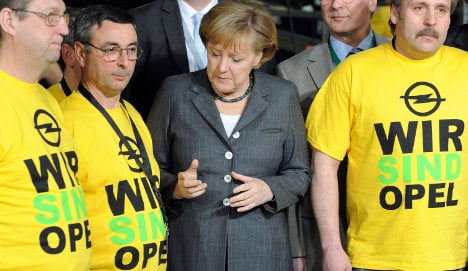The emotions stirred by Thursday’s announcement that US carmaker General Motors had agreed to sell its German unit Opel to the Canadian auto parts firm Magna could lead one to think something revolutionary had happened. But as grave as the employees’ concerns are, and as nostalgic as Germans might be for vintage models like the Kadett and the Rekord, the national economy is not dependent on Opel.
And with Germany’s general election looming, there is a demand for clear truths. There have to be winners and losers. One thing is clear: GM, America’s biggest car manufacturer, has bowed to pressure from Germany. The next two weeks will decide which political party will be able to capitalise on this in the election campaign.
“The joy is the focus right now,” said Chancellor Angela Merkel of the conservative Christian Democrats (CDU) without much joy, but she’ll certainly do her best to milk it for political capital. This should be easier for the centre-left Social Democrats and their candidate trying to oust Merkel from the Chancellery, Frank-Walter Steinmeier. Did he not come up with the wildly popular car-scrapping premium, the Abwrackprämie? Did he not fight stubbornly shoulder-to-shoulder with the trade unions to secure the Magna deal? Didn’t we distinctly see the conservatives waver then? Didn’t Economy Minister Karl-Theodor zu Guttenberg almost talk Opel into insolvency?
Still, the deal demonstrates the new prerogative of Germany’s political class. With the economic crisis raging, countries all over the world are bailing out corporations with unimaginable amounts of money. The US government has forked out $50 billion for GM alone. Opel’s plight has loosened €1.5 billion from the pockets of Germany’s federal and state governments, while around twice that much is still available to the carmaker with hardly a condition or a caveat in sight. And that isn’t necessarily the end of it. The German government is insisting that no new agreements will be made, but that can change if push comes to shove again.
Even if the state is apparently laying itself open to blackmail, those vast sums of money are having an effect. For a long time the Opel impasse looked like it would end in defeat for the politicians. The federal government, the state governments and the trade unions had all backed the Magna-led consortium bid for months, only for GM to first bring another bidder to the table, and then consider not selling it to anyone. But in the end GM acquiesced – though Detroit will keep a third of Opel in order to not burn its bridges with its European and Russian customers. Besides, GM would have had difficulty trying to recapitalise Opel on its own.
So Germany’s politicians won and GM won, but whether Opel and its workers will win is still undecided. Even the Magna plan, for which everyone fought so hard, will not work without huge redundancies. Only Opel’s Antwerp plant is to be closed for now, but no-one knows how long the German plants will be safe. Magna wants to cut nearly a fifth of Opel’s 55,000-strong European workforce, blaming overcapacity in the auto industry and Opel’s high manufacturing costs.
And the carmaker’s economic prospects also remain uncertain. Opel, having spent 80 years in American ownership, is still trying to catch up technologically. This won’t necessarily be any easier in the hands of a Russian bank and a Canadian parts supplier. There is even a fear that Opel might experience a similar fate to Siemens, who fobbed its mobile phone division to BenQ. But that couldn’t help avert insolvency and job losses for German workers as the technology was shipped off to Taiwan. Magna and Sberbank can have the best intentions in the world, but no-one can protect Opel if plants are moved elsewhere.
Such concerns are not born of Cold War prejudices, as some have suggested, but relatively simple calculations. Magna and Sberbank want to make a profit from the majority of Opel they’ve just taken over. But the last few decades have shown how difficult this is – GM could only manage it in spurts.
If Opel is to establish itself as a manufacturer of environmentally friendly cars, massive investment will be necessary. The German production sites are too expensive to make Opel into a manufacturer of cheap cars for emerging economies. This is Opel’s dilemma – this week’s announcement merely granted its workers some breathing space.
This commentary was published with the kind permission of Berlin newspaper Der Tagesspiegel, where it originally appeared in German. Translation by The Local.



 Please whitelist us to continue reading.
Please whitelist us to continue reading.
Member comments